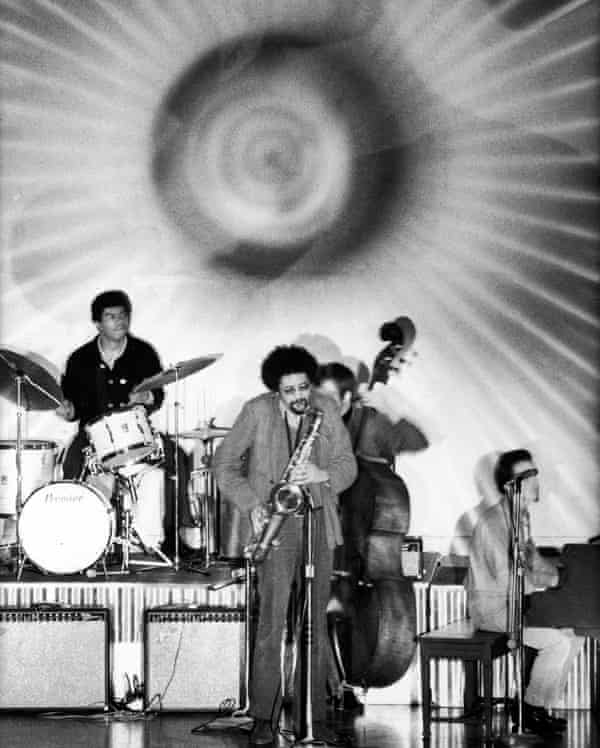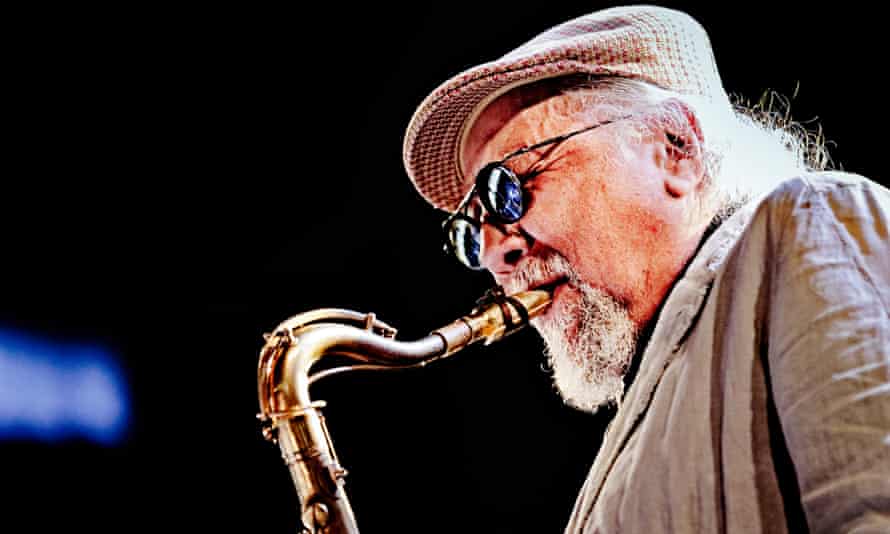He played gigs to a young Elvis, got high with the Grateful Dead and made an enemy in Miles Davis. And, at 83, the saxophonist who collided jazz and rock still has his spirit of adventure.
“We played the Royal Albert Hall in 1964,” says Charles Lloyd, recollecting his first ever UK performance. “Packed it to the rafters.” He was 26, playing tenor saxophone in Cannonball Adderley’s majestic band and getting his first taste of a world beyond US jazz and blues clubs. “I’m looking forward to returning,” says Lloyd of this weekend’s appearance at the EFG London jazz festival.
Now 83, he speaks in a drawl that mixes jazz argot and spiritual entreaties – he says he spent the pandemic “building steps”, meaning to a higher plane rather than a DIY project – and is raring to re-engage with an audience. “I’ve been playing in front of audiences since I was nine. Been a professional musician since I was 12. It’s what I do.”
What Lloyd “does” is work alongside more giants of contemporary music than possibly anyone else alive. Born in Memphis, Tennessee, he grew up in a hotbed of jazz, blues and country music: Phineas Newborn and Booker Little, two Memphis jazz prodigies, were his closest teenage associates, but young Charles found playing blues paid best.
This was the American south, where “that world of man’s inhumanity to man – racism, segregation – was a game somebody had set up, a botheration”. And yet he says of Memphis: “We were in Mecca, you know? The music was just so powerful. We were bit by the cobra of Bird [Charlie Parker] and Prez [Lester Young], so it was no turning back, but the blues is part of our ethos and those were the gigs that were available to us. Howlin’ Wolf would come to town and say: ‘You play with me, you eat pork chops – you play in other bands, you eat neck bones!’ He could pay about $5 more, $10 more, than the other bands. Naturally, you wanted to play with Wolf. Plus the fact he would shake those buildings when he played. And the ladies, throwing their panties up on the stage and pulling on his pants!”
Lloyd left Memphis for Los Angeles, to study Bartók at the University of Southern California: “I think because of his work with his folk themes and folk melodies, it touched us, there was some some kind of simpatico.” A classical student by day, a jazz musician by night in an LA scene dominated by a group of players who would pioneer free jazz. Their leader, Ornette Coleman, became Lloyd’s mentor.
He remembers a 1956 jam session. “Billy Higgins, Ornette, Dexter Gordon, a lot of guys were there. I got up to play and, afterwards, Ornette came up and said: ‘Man, you sure can play the saxophone but that don’t have a lot to do with music.’ He was about eight years older than me and, essentially, was saying that I could play but I didn’t have it together yet. We became friends, played and practised a lot together. It was a rich community in California, so I got blessed again.”

Other firsts: playing the Fillmore, often alongside the new psychedelic bands (“those guys and gals in San Francisco, they said: ‘The only thing happening is us and Charles Lloyd’”), and taking modern jazz to the Soviet Union. His 1967 live album Love-In – with its psychedelic title and sleeve and performance of a Beatles song – was aimed directly at his youthful fanbase and led to detractors. The New York Times critic, Martin Williams, waspishly noted: “With wildly bushy hair, military jacket, and garishly striped bell bottoms, he looks like a kind of show-biz hippie. He usually sounds like a kind of show-biz John Coltrane.”
The quartet imploded acrimoniously in early 1969, with Miles Davis – long envious of Lloyd’s success – hiring DeJohnette and Jarrett for his adventures in fusion. “Miles is very creative, a very special guy – he changed music a bunch of times,” Lloyd says, talking about the trumpeter as if he were still alive. But the friction meant “we can’t get along. He’s extremely talented but he wants all the girls and all the money.”
Lloyd might have been famous, but he was desperately unhappy. “You must understand, fame and fortune, it’s like a hog plum – looks real juicy and you bite into it and you break your teeth off because it’s all pit and skin. So, I came to realise the fame and fortune were why I was miserable. They weren’t what they seem. You know, I got all these demands on me: ‘Sign this, do that, be over here …’ Around ’68 things started getting bad: my marriage and the tragic magic.”
What, I ask, is the tragic magic? “Some powder that you take in you. You do things with it. And you don’t have any problems, you just need to get your tragic magic each day. I’d go play with the Grateful Dead and they’d put Peru on the table, you know, a big mountain of coke and stuff … When you’re medicating yourself like that, you’re in another zone. At first it was stimulating but, after a while, it was impeding the creative. I decided I better leave New York because I saw many of my peers dying and dropping off. I came to California to heal myself. And that’s what I did.”
“I didn’t know who the Beach Boys were but, it turned out, they were fans of mine. Mike Love started inviting me up to Brian Wilson’s place – Brian had a house in Bel Air with a studio in it and an engineer, there all the time. Atlantic had blackballed me and I’d run out of bread so they said: ‘You can use this studio.’ Brian would come down from his sandpit upstairs and sit in on the sessions and the band started singing on my records and stuff. It was an enlightened situation.”

Lloyd would play on several Beach Boys albums (including Surf’s Up), toured with the band and even formed Celebration, a side project with Love and Al Jardine, in the late 70s. Settling in Big Sur, a spiritual community further up the west coast, Lloyd relaunched his quartet in 1981 after encountering the French jazz pianist Michel Petrucciani. Their performances found Lloyd welcomed back by jazz audiences and critics but, having successfully launched Petrucciani’s career, he retreated back to Big Sur and silence for nearly a decade. A near-death intestinal illness convinced Lloyd to re-engage with jazz. Signing to the German jazz label ECM in 1989 and Blue Note Records in 2015, he has since released 23 albums and toured widely. “I’m a seeker and I’m trying to change the world, right?” says Lloyd of his productivity. “And I’m doing it with sound.”
“Back in Memphis I used to jam with a country band who had a hot pedal steel guitar player so, by playing with Bill Frisell [guitar] and Greg Leisz [pedal steel], I’ve managed to reach after that. I like weird connections because I don’t like to play with one hand behind my back. I got to have a full deck of cards: no restrictions.”
Quite the raconteur, the famous names keep popping up. Lloyd notes that, in Memphis, a young truck driver called Elvis used to come and study one of his teenage bands. “Every night, to watch Calvin Newborn, Phineas’s younger brother, because he would be playing guitar and he jumped way up in the air, shaking his legs. Well, Elvis couldn’t do that guitar stuff that Calvin could do, but he could shake his leg, so he watched and got some stuff from those gigs.” He mentions lost recordings with the Dead and plans to record with Jimi Hendrix that were thwarted by his death; he also wanted to record with the Byrds, but his label refused to sanction the collaboration. “They said no, it’s not going to happen – they were still doing racial polarities.”
I mention the UK’s fecund jazz scene, something Lloyd is unaware of – “except I met that girl, [Nubya] Garcia, at a festival in the US, she’s a fan of mine” – and I explain how the spiritual jazz sound he helped pioneer is currently very popular in Britain. “If I’d known I was in vogue I’d have raised my fee,” drawls Lloyd, before chuckling. It looks as if lessons learned from Howlin’ Wolf are still being applied today.







More Stories
CD review: George Benson – Dreams Do Come True: When George Benson Meets Robert Farnon – 2024: Video, CD cover
The band was tight as ever. The Warren Haynes Band cuts loose: Video, Photos
Interview with Alvin Queen: Feeling Good – I heard these tunes played by … Video, new CD cover, Photos